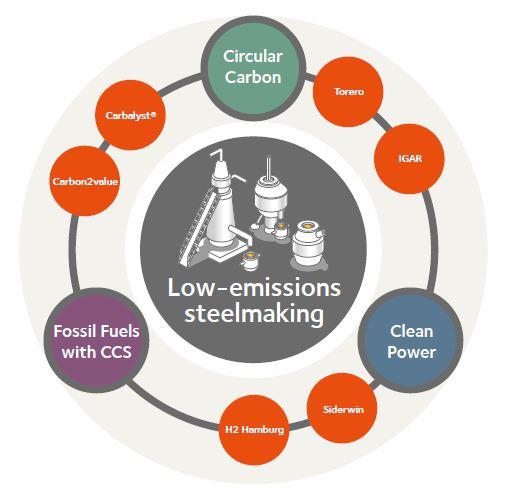Products
Product pages available in
EN - DE - FR - ES
Sustainability
News, events and stories

Report states ArcelorMittal’s ambition to significantly reduce global CO2 emissions and be carbon neutral in our European operations by 2050
29 May 2019, 08:00 CET - ArcelorMittal has today published the first Climate Action report in which we announce our ambition to significantly reduce CO2 emissions globally and be carbon neutral in Europe by 2050. To achieve this goal, we are building a strategic roadmap linked to the evolution of public policy and developments in low-emissions steelmaking technologies. A target to 2030 will be launched in 2020, replacing our current target of an 8% carbon footprint reduction by 2020, against a 2007 baseline.
The report explains in greater detail the future challenges and opportunities for the steel industry, the plausible technology pathways we are exploring as well as our views on the policy environment required for the steel industry to succeed in meeting the targets of the Paris Agreement.
“We believe it can be possible for the steel industry to deliver carbon emissions reductions targets in line with the Paris agreement. We are committed to this objective and are actively piloting several low-carbon steelmaking technologies. Central to achieving this aspiration will be supportive policy to ensure a global level playing field, access to sufficient clean energy at competitive prices and access to finance. The energy industry has made great strides in creating a pathway to lower emissions through supportive policy and we are confident the same can be true for steel.
Lakshmi Mittal, Chairman and CEO, ArcelorMittal
As one of the world’s most prolific materials, with 1.7 billion tonnes of steel produced in 2018, the steel industry today accounts for approximately 7% per cent of global emissions. And with demand for steel and materials set to further increase - forecasts show demand rising to 2.6 billion tonnes in 2050 - it is vital the industry finds ways to significantly reduce its carbon emissions to successfully meet the ambitions of the Paris agreement and help limit the global average temperature rise to less than two degrees.
At present carbon is used as a reductant in the blast furnace to separate oxygen from iron-ore as a critical part of the steel-making process. Significantly reducing the emissions footprint of steel will, in all likelihood, require a fundamental change in the science of steelmaking
As the world’s leading steel company, we recognise we have a leading role to play in developing breakthrough technologies that will support and enable a global transition to a low-carbon economy. We have identified three distinct pathways that have the potential to deliver a significant reduction in carbon emissions. These are:
- Clean power steelmaking, using clean power as the energy source for hydrogen-based steelmaking, and longer-term for direct electrolysis steelmaking;
- Circular carbon steelmaking, which uses circular carbon energy sources, such as waste biomass, to displace fossil fuels in steelmaking, thereby enabled low-emissions steelmaking;
- Fossil fuel carbon capture and storage, where the current method of steel production is maintained but the carbon is then captured and stored or re-used rather than emitted into the atmosphere.

We believe that all three pathways offer significant emissions reduction potential aligned with science-based targets and are currently testing various technologies across all three pathways in our European operations. This technology portfolio will enable us to pursue the appropriate option depending on the pace of technology and public policy development, which will impact which pathway becomes the most viable in the countries and regions where we operate.
In terms of public policy recommendations, ArcelorMittal advocates the development and implementation of carbon regulations and market mechanisms to enable the deployment of low-emissions steelmaking that will help to deliver the global objectives of the Paris agreement. Our global policy recommendations include:
- Global level playing field is needed to maintain the competitiveness of low-emissions steelmaking and to avoid the risk of carbon leakage, for example, through green border adjustments;
- Access to abundant clean energy at affordable prices will be key to be able to scale up low-emissions technologies;
- Facilitating necessary clean energy infrastructure will be needed to advance large-scale implementation of low-emissions technologies;
- Access to sustainable finance in order to accelerate and roll out technology development;
- Accelerate transition to a circular economy by incentivising the use of waste streams as inputs in manufacturing processes.
ArcelorMittal will also intensify dialogue with stakeholders who have an important role to play in enabling these technology routes to become a viable reality and highlights the need for a more collaborative approach if the full potential is to be unlocked.
“Limiting the temperature increase to two degrees or less is no easy challenge. Real and genuine understanding of the complexities and an approach of collaboration and flexibility will be critical if we are to succeed. Specifically, we will need a more supportive policy environment that considers the global nature of steel, the cost implications of significantly changing the way steel is made and the clean energy supply needed to do so. If we can work together to solve the problem, I’m convinced the steel industry will be able to make a significant contribution to reducing carbon emissions globally.”
Lakshmi Mittal, Chairman and CEO, ArcelorMittal






